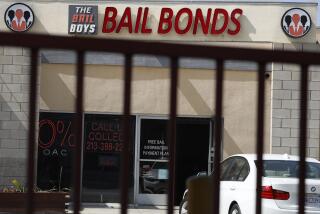Justices wary of mandatory blood tests in drunk driving cases
- Share via
WASHINGTON — The Supreme Court justices sounded wary Wednesday of giving the police a free hand to forcibly take blood from motorists suspected of drunk driving.
“It’s a pretty scary image of somebody restrained, and a representative of the state approaching them with a needle,” Chief Justice John G. Roberts Jr. said.
Though the police stop swerving drivers at all hours of the day and night, rarely are motorists required to undergo a blood test. Typically, an officer tells a driver who appears to be drunk to get out of the vehicle, walk a straight line and recite the alphabet. If he fails those tests, the motorist is asked to blow air into a device that measures alcohol in the blood.
A blood test is a fall-back measure, an option for when a driver refuses to take a breath test. But the law in half the states and in many court jurisdictions says an officer must obtain a search warrant before he can force a motorist to have a needle stuck in his arm.
Seeking a change that could have national effects, Missouri prosecutors and a Justice Department lawyer urged the high court to set aside the requirement for a search warrant. They argued that because alcohol dissipates in the blood, a police officer need not take the time to check with a magistrate.
“Quickly securing blood alcohol evidence with as little delay as possible is incredibly important,” John Koester Jr., a Missouri state attorney, told the justices. It takes at least 30 minutes and as long as two hours to obtain a search warrant, he said.
But in their questions and comments, most of the justices said they were reluctant to set aside the warrant requirement in routine drunk driving cases.
As Justice Sonia Sotomayor said, the 4th Amendment’s ban on “unreasonable searches” has limited the power of officials to order highly personal probes. “So how can it be reasonable to forgo the 4th Amendment in a procedure as intrusive as a needle going into the body?” she asked.
Sotomayor, who regularly injects herself with insulin to treat her diabetes, worried too about the effects of a court decision in favor of blood tests. Most jurisdictions rely on breath tests. A ruling “by us in your favor is going to change that” and encourage routine use of blood tests, she told the Missouri prosecutor.
Koester disagreed. “I think the end result will be more people will agree to take a Breathalyzer test,” he replied.
“Why don’t you force him to take the Breathalyzer test, instead of forcing him to have a needle shoved in his arm?” asked Justice Antonin Scalia.
Because the suspect must be willing to blow his breath into the device, Koester replied. “It’s sort of like you can put a balloon in front of somebody’s mouth, but you can’t make him blow it up,” he said.
The case before the court, Missouri vs. McNeely, started when a state patrolman stopped Tyler McNeely for speeding about 2 a.m. on Oct. 3, 2010. The motorist failed the roadside sobriety tests and refused to take a breath test.
In every state, including Missouri, refusing to take a breath test can result in your driver’s license being suspended or revoked. McNeely, however, faced a possible prison term because he had previous convictions for drunk driving. The officer took the motorist to a hospital and — without stopping to request a search warrant — told an orderly to take a blood sample from McNeely. A lab reported his blood alcohol level was .154%, nearly double the legal limit of .08%.
But a trial judge and the Missouri Supreme Court threw out the blood test evidence against McNeely, ruling that the officer should have obtained a search warrant.
More to Read
Sign up for Essential California
The most important California stories and recommendations in your inbox every morning.
You may occasionally receive promotional content from the Los Angeles Times.











